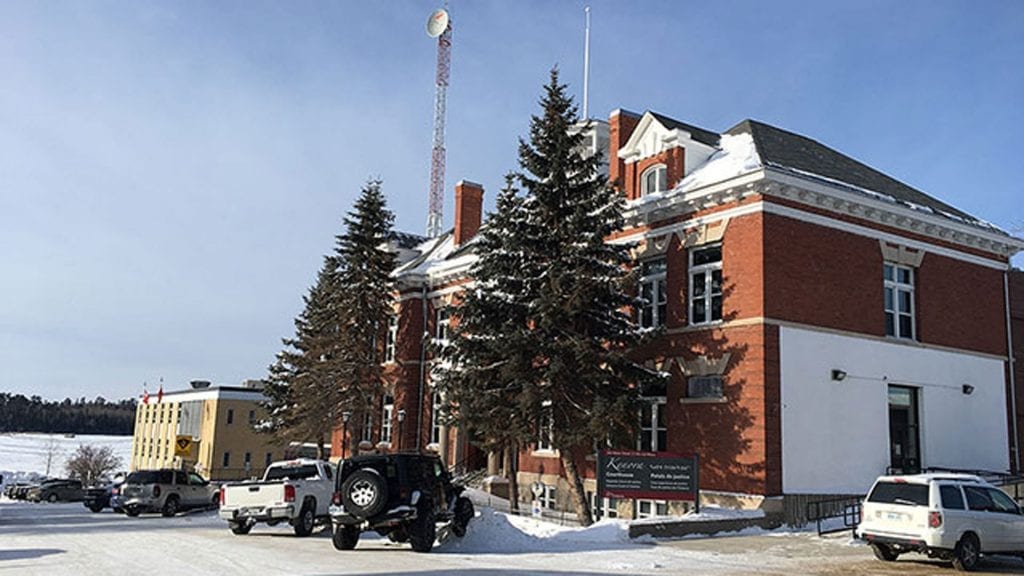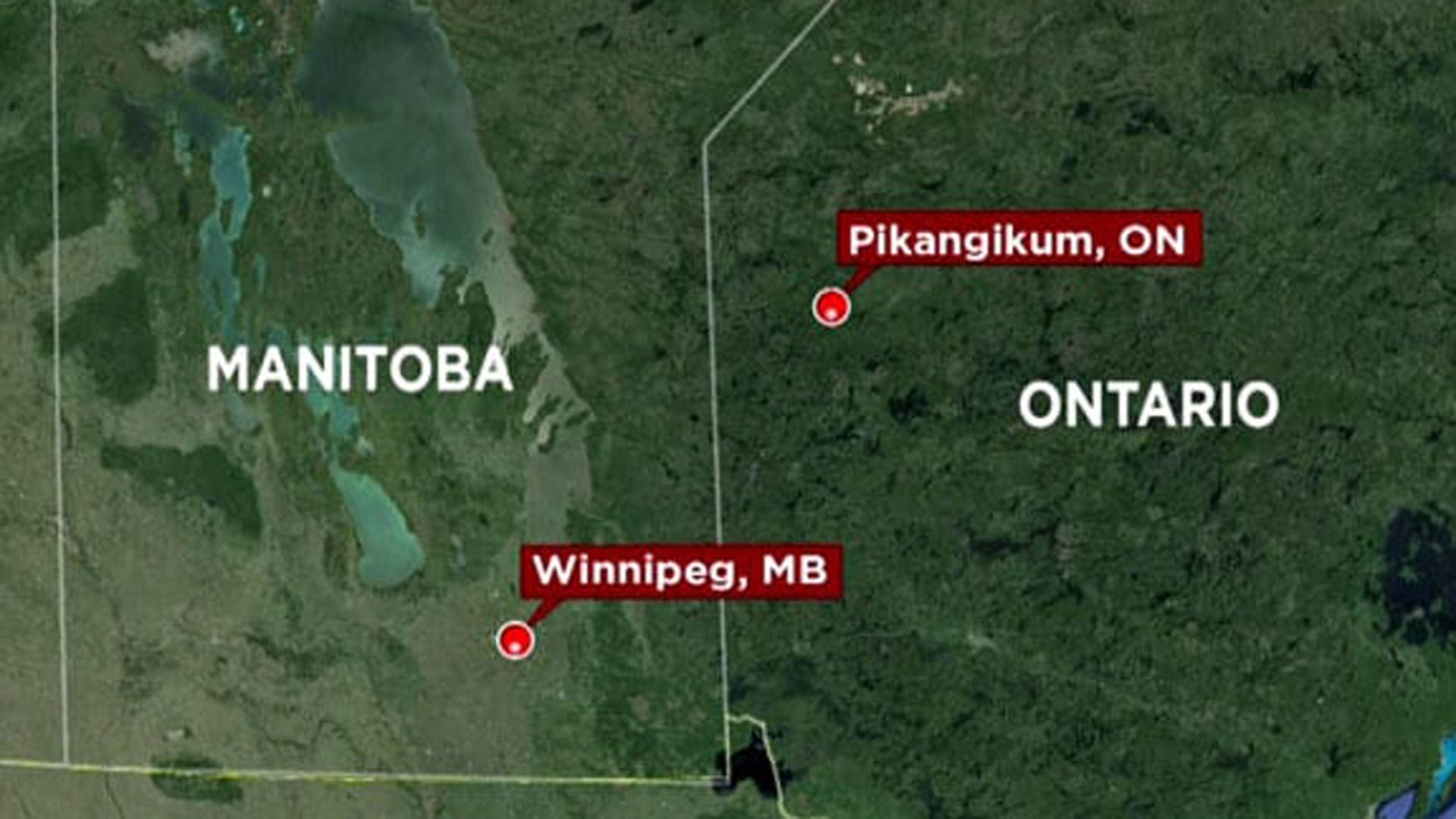
The courthouse in Kenora, Ont. where Justice David Gibson read out his decision, which was translated into Ojibway, on Oct. 2. Photo: Kathleen Martens/APTN file
Ontario sentencing law ignores treaty obligations and violates the charter equality rights of six Pikangikum First Nation mothers by requiring them to fly south, at their own expense, every weekend to serve out their mandatory minimum jail sentences, a judge ruled on Friday.
Advocates and lawyers are hailing Justice David Gibson’s wide-ranging, 36-page decision as a “landmark” ruling that demonstrates the immediate need to honour treaty obligations, address systemic discrimination and reform the justice system.
“The legal regime I have been asked to consider in this application, though neutral on its face, treats the people of Treaty #5 as second-class citizens. The Government is not fulfilling its treaty obligations and young indigenous people are taking their lives in shocking numbers,” Gibson wrote.
“This is happening right now and not because of things that happened in the distant past but because of things that are being done and not being done as I am reading this judgement.”
Read the full ruling: Reasons for Judgment released on October 2, 2020
Sherry Turtle, Audrey Turtle, Loretta Turtle, Cherilee Turtle, Rocelyn Moose, Tracy Strang all pled guilty to a drinking and driving offense which carries a 90 days or less mandatory minimum jail sentence. They all live with their young children in the Anishinaabe settlement used for thousands of years in northwestern Ontario.
The law allows people to serve these sentences out on weekends through what is called intermittent sentencing. But the closest jail is hundreds of kilometres south in Kenora, Ont. and is notorious for violence, overpopulation and overincarceration of First Nations people, court head.
The women argued the remoteness of their territory made intermittent sentencing practically unavailable, logistically impossible and prohibitively expensive and therefore contrary to Section 15 of the Charter of Rights and Freedoms, which guarantees equality in law.
To leave their families and make this journey every week is itself a form of cruel and unusual punishment on top of the sentence, they argued further. Ultimately, they wanted an a constitutional exemption from having to abide by the sentence on these grounds.
Though he agreed with the first premise, the judge didn’t agree the punishment was cruel and unusual and didn’t grant the exemption – but only because the Ontario government offered to organize and finance the women’s travel.
Gibson rejected this as a long-term solution, calling it an ad hoc workaround that “is one of the hallmarks of an unconstitutional legal regime.”
The Crown opposed the application by contending that the onus was on the women to prove their claim, which they hadn’t, and that the offer to accommodate travel south rendered the question moot.
Jail has ‘grotesque similarities’ with residential schools
Gibson heard evidence describing the squalid and occasionally brutal conditions of life behind bars at the 94-year-old Kenora jail, where 94 per cent of the inmates are Indigenous.
One witness described how overcrowding conditions during lockdowns can lead to inhumane living arrangements. Four prisoners share a cell with two bunks – one in either bunk, one underneath the bed and one beside him on the floor who “conceivably could have their head right near the toilet.”
These lockdown conditions sometimes last for days. A former jail superintendent explained that violence increases when the jail is overcrowded.
Fight clubs are “no secret within the walls of the jail” and three or four-against-one assaults are common.
“When one considers the impact such brutalizing experiences must have on inmates and what they must carry home with them to their First Nations it is very hard not to notice the grotesque similarities between these kinds of ‘correctional institutions’ and residential schools that have caused such lasting damage to indigenous communities,” Gibson said.
Examining a difficult history
Pikangikum First Nation and Aboriginal Legal Services (ABL) intervened to support the women’s arguments.
Evidence from chiefs, Elders and others described a once self-sustaining, autonomous community besieged by the destructive impacts of colonization: high rates of criminality, alcoholism, solvent abuse and one of the highest suicide rates on earth.
An anthropologist in 1932 described birchbark homes spaced out across the summer settlement at Pikangikum Lake, scores of fish curing or smoking on racks, tanned hides drying for clothes or moccasins, people mending fishing nets, building canoes or snow shows, gathering berries and chopping wood.
In 1954, there was one reported incident of assault. In 2018, the Ontario Provincial Police received 12,000 calls for service, most related to drinking or gas sniffing.
“The total disruption of our way of life has led to crime in our nation. Beginning in or around the 1970’s, people from Pikangikum started to be incarcerated in large numbers,” Chief Dean Owen said. “When people were living a traditional lifestyle there was little crime and problems were dealt with by the community.”

Gibson dealt extensively with the negative intergenerational effects of colonialism in his decision.
“In these circumstances, where the Pikangikum people’s traditional lifestyle has been disrupted by over harvesting, the systematic separation of children from their parents in residential schools, upsetting delicate family structures and ancient oral traditions, causing widespread dependency, substance abuse, violence and an epidemic of youth suicides, while the government refuses to fulfil its solemn treaty promise to assist, any legal regime of that government that has the effect of extending the damaging effects of colonialization, will be wrongfully discriminatory,” he said.
“In a community where 75 per cent of the population is under the age of 25, removing mothers from their children for extended periods of time will undoubtably exacerbate existing problems in this vulnerable and destabilized First Nation. In this case the issue is not overincarceration, per se, but rather the direct extension of the corrosive effects of colonialization.”
Reforming the justice system
Nishnawbe Aski Nation, an advocacy organization representing 49 Ontario First Nations, said the ruling reveals the need for “complete transformation” of the justice system.
“I acknowledge his respectful consideration of the history of injustices faced by the members of Pikangikum and his finding that members who reside in the community do not receive equal treatment under the law,” said Grand Chief Alvin Fiddler. “I urge the Crown to not waste time by seeking an appeal and seize this opportunity to transform the administration of justice.”
Jonathan Rudin, program director at ALS and lawyer in the case, believes the Crown needs to immediately sit down and consult with the community to come up with solutions.
“The answers are not going to come from the Crown. Whether it’s located in Kenora or whether the Crown is located in Ottawa, the answers are going to come from the community.”
He said that this problem isn’t going away and that the pandemic offers a chance to change things.
“When the court starts to come into Pikangikum again, we’re going to be in the same situation, and Justice Gibson has made it very clear that the next person who wants constitutional exemption for this offence is going to get one – and he would like something in place to address that concern.”
Gibson explained Ontario’s plan to pay the six women’s travel expenses for the duration of their sentences, while acceptable in this case, isn’t a long-term option.
It would force Indigenous people, “as though asking for a favour,” to seek the Crown’s discretion in order to receive equal treatment at the hands of the law, he said.
“It turns rights holders into supplicants.”
Lawyers call for governments to honour treaty promises
Gibson characterized treaties as “sacred agreements between peoples,” which can become distorted when one party has far more power than the other.
“In the case of Pikangikum and the Queen, an agreement for mutual assistance has become an exercise in the crudest form of colonization, with devastating consequences for the people of Pikangikum.”
Counsel for the applicants lauded the case, but they also urged government to heed – and not appeal – the judge’s ruling.
“This decision speaks a truth that has gone unspoken and unheard for too long,” said Luke Hildebrand, lawyer for the First Nation. “They has been left exposed to a foreign criminal justice system not designed by or for them, and that is utterly incapable of accounting for their realities. This decision delivers an unequivocal message to the Crown: fulfill your Treaty obligations and get on with restoring Pikangikum’s social and legal systems.”
Gibson described his personal familiarity with the community, having administered the law there since 1993.
“I have been coming to Pikangikum for a very long time,” he said in an exchange with then Chief Amanda Sainnawap.
“I’ll simply indicate that I’m looking for help from Chief and Council, the elders whoever can offer help in this community to find a way to help people live a good life and find some balance. If we reach a stage in this proceeding where I need the assistance of Chief and Council to arrive at a just result can I ask for your help?”
The answer was short.
“Yes.”










